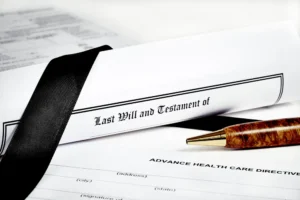What Happens When Someone Dies Without A Will in Texas?~3 min read

If someone dies in Texas without a will, the Texas Estates Code governs how the estate is distributed. A person who dies without a will is said to have died “intestate.” The law provides complicated guidance as to how property of a person who dies intestate is divided. The important thing to remember is that the estate does not automatically go the state but is distributed among the decedent’s closest relatives.
Property Exempted from Intestate Estate Distribution Laws
Some types of property are exempted from the Texas Estates Code distribution laws that apply to the estate of someone who dies intestate. For example, property owned in joint tenancy with someone else will go to the other person. Many financial assets go to the beneficiary or beneficiaries named in the policy, trust or on the account. These include:
- Proceeds of life insurance.
- Funds in retirement accounts, like IRAs or 401(k)s.
- Property that has been transferred to a living trust.
- Funds in a bank account that have a payable-on-death provision, payable to a specific named person.
These assets may go into the estate if no one is named or if no successor is named and the originally named individual predeceases the holder of the asset.
Property Distribution Laws if Someone Dies Intestate
If you die intestate, the distribution of your property depends on the relationship of your close relatives who remain after you die. Although the specifics can get complicated, especially with half children, the following rules apply:
- You leave a spouse but no children: Everything goes to your spouse.
- You leave children but no spouse: Everything is divided among the children.
- You leave a spouse and children, and the children are also the children of your spouse: Your spouse inherits all community property and one-third of your separate personal property and the right to use your real estate for the remainder of the spouse’s life. Everything else is divided among your children.
- You leave a spouse and children, but the children are not the children of your spouse: Your spouse inherits half of the community property, 1/3 of your separate personal property and the right to use the real estate for the remainder of the spouse’s life. The children inherit everything else plus half of the community property which is divided among them.
- You leave a spouse and parents, but no children and no siblings: Spouse inherits all of the community property and separate personal property, and half of your real estate. Your parents inherit everything else.
- You leave siblings but no parents, children, or spouse: Your estate is divided among your siblings.
There are many other scenarios as the relationship of survivors to you become more distant. Attorney Aubry Dameron at Springer & Lyle can answer questions you have regarding wills, probate, and dying intestate. Contact her at 940-387-0404 to schedule an appointment for a consultation.






